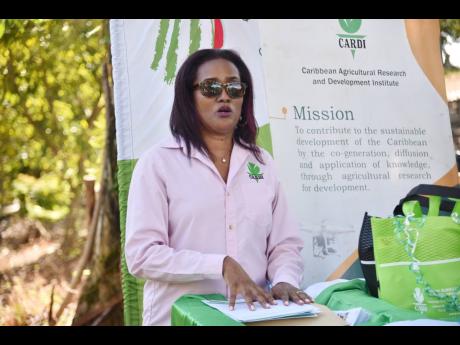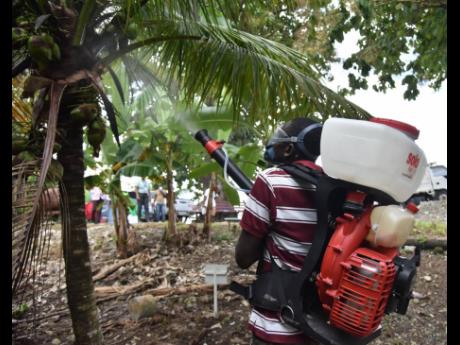CARDI basks in fruits of 49 years of work in agricultural sector
The Caribbean Agricultural Research Development Institute (CARDI) on Tuesday celebrated its 49th anniversary of helping to serve the agricultural research and development needs of CARICOM member states.
Dionne Clarke-Harris, CARDI representative for Jamaica, who was speaking at the reaping of coconut seed nuts exercise at Wilmington district in St Thomas, under the organisation’s European Union (EU) Coconut Industry Development for the Caribbean partnership project, stated that CARDI’s “work and reason for being” were its farmers.
She emphasised the value of farmers to the country, describing them as “the people who bring us the food”, and said that having a thriving agricultural sector depended heavily on making sure the farmers’ best practices were top-notch and their livelihoods are preserved.
The institute’s CARDI Day is significant as it is the anniversary of the signing of the agreement establishing CARDI in 1974 in Georgetown, Guyana.
CARDI is mandated to assist in improving the food and nutrition security of the economy and the Caribbean region.
CARDI Executive Director Ansari Hosein noted that the institute has persevered despite encountering several challenges and disruptions throughout the years.
He added that the organisation will continue to advocate for more funding for agricultural research as this is pivotal to helping CARICOM achieve its Vision 25 x 2025 – an initiative aimed at reducing the region’s food import bill – and for the Food and Agriculture Systems Transformation (FAST) Strategy of the Organisation of Eastern Caribbean States (OECS).
Speaking specifically to the eight-year EU-financed regional coconut project, which comes to an end this year, Hosein said that it had made significant contributions in areas of greatest need and had assisted in resolving issues with pests and diseases, access to financing, and the development of value-added products.
Hosein said that to address the unavailability of quality planting material, 75 coconut plant nurseries have been established or rehabilitated across the 12 project countries.
“Collectively, these nurseries have the capacity to produce over 300,000 coconut seedlings per year,” he added.
The CARDI executive director further described the introduction of the Brazilian Green Dwarf coconut variety into Guyana as “a game changer to the industry” that other member states have expressed interest in acquiring.
Some 13,000 seed nuts of this variety were also imported into Dominica.
Speaking to some examples of the work that CARDI has done over the course over the year, he highlighted how Belize, which had expressed a desire to reintroduce lethal yellowing-tolerant and dual-purpose coconut varieties into the country, received support through Jamaica’s Coconut Industry Board’s facilitation of the importation of 8,000 Maypan coconut seed nuts into Belize.
Hosein further highlighted the Caribbean Development Bank-financed Sweet Potato Value Chain Enhancement and Technology Transfer Project, a research work that is ongoing to identify and improve the availability of market preferred and climate-resilient sweet potato varieties and genotypes.
“Agro-ecological zone and drought tolerant trials are ongoing in four member states. The results of these, coupled with the development of extension aids to transfer technologies developed to the end users, will assist with closing the huge gap that exists between potential and actual yield in the Caribbean,” he said.
It is expected that by the end of 2023, twelve schools in Trinidad and Tobago and Barbados will benefit from climate-smart school gardens, where the main objective is to promote positive attitudes and awareness among children in learning how to grow healthy food for better nutrition.
In 2023, CARDI also began implementation of the innovative early detection pest and disease management system using loTree sensor in the real-time digital monitoring of the South American Palm Weevil (SAPW) for Conserving Coastal Coconut Palms in Select CARIFORUM Countries project.
This project, Hosein said, involves the deployment of sensors to monitor and detect the presence of the SAPW in coconut palms in nine coastal communities in Trinidad and Tobago, St Vincent and the Grenadines, and St Lucia.
“The deployment of this technology will inform timely mitigation and control strategies for the pest,” he said.
“These are a few examples of some of the work done by the institute over the last year. As we get set to usher in our new strategic plan (2024-2028), the institute remains committed to providing science-based solutions to reposition the agricultural sector. We will continue to expand our partnerships to support agriculture development to have a greater regional impact,” Hosein said.


